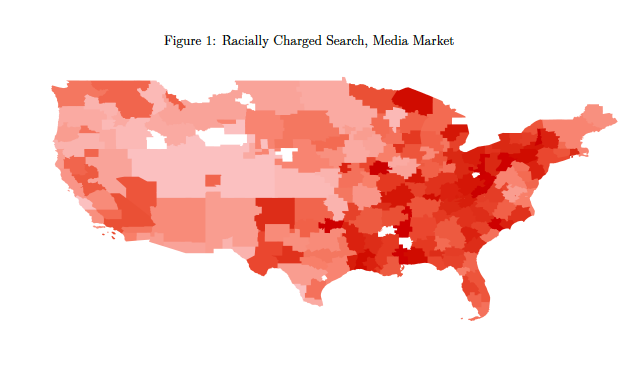Did Racism Cost Obama Votes in 2008?
A new paper (PDF here) by Seth Stephens-Davidowitz, a Harvard Ph.D. economics student, attempts to measure whether “racial animus” cost Barack Obama votes in 2008. Using location-specific Google searches for racial epithets collected on Google Insights, and comparing Obama’s 2008 performance to John Kerry‘s in 2004, the study concludes that racism cost Obama 3 to 5 percentage points in the popular vote:
Traditional surveys struggle to capture socially unacceptable attitudes such as racial animus. This paper uses Google searches including racially charged language as a proxy for a local area’s racial animus. I use the Google-search proxy, available for roughly 200 media markets in the United States, to reassess the impact of racial attitudes on voting for a black candidate in the United States. I compare an area’s racially charged search volume to its votes for Barack Obama, the 2008 black Democratic presidential candidate, controlling for its votes for John Kerry, the 2004 white Democratic presidential candidate. Other studies using a similar empirical specification and standard state-level survey measures of racial attitudes yield little evidence that racial animus had a major impact in recent U.S. elections. Using the Google-search proxy, I find significant and robust effects in the 2008 presidential election. The estimates imply that racial animus in the United States cost Obama three to five percentage points in the national popular vote in the 2008 election.
To circumvent the problem of people under-reporting their own racist tendencies, Stephens-Davidowitz used the percentage of an area’s total Google searches that included the n-word as a proxy for an area’s level of racism. It turns out the word appeared as frequently as words like “charity,” “hispanic,” “nausea,” “sweater,” and “migraine(s).”
The demographic factor most strongly correlated with racially charged searches is education level. Stephens-Davidowitz found that a 10 percentage-point increase in college graduates correlates with almost a one standard deviation decrease in racially charged search.
Searches for the n-word were most popular in West Virginia, upstate New York, rural Illinois, eastern Ohio, and southern Mississippi. They were least popular in Laredo, Tex. (a largely Hispanic market); Hawaii; parts of California; Utah; and urban Colorado.
Here’s a map of the results, with the darker colors representing areas with the most frequent searches for the term:

Search volume for the n-word from 2004-2007, at the media market level. Darker areas signify higher search volume. White areas signify media markets without data.
See page 8 of the study to see how the author addresses the issue that the n-word is a common reference in rap songs.
While Obama won 53.7 percent of votes in ’08, the study suggests he would have claimed between 56.7 and 58.7 percent if “the whole country had the racial attitudes of the most tolerant areas.” Stephens-Davidowitz concludes that racism gave John McCain “the equivalent of a home state advantage country-wide.”
(HT: Marginal Revolution)

Comments